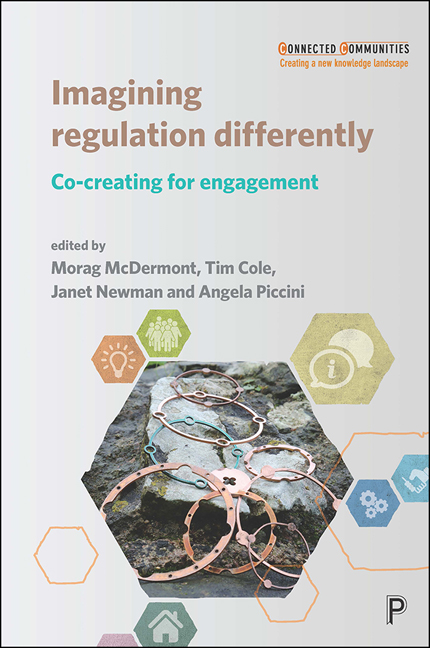Book contents
- Frontmatter
- Dedication
- Contents
- List of Figures, Tables and Boxes
- List of Abbreviations and Acronyms
- Notes on Contributors
- Acknowledgements
- Series Editors’ Foreword
- 1 Introduction: From the Regulation of Engagement to Regulating for Engagement
- 2 Co-Production as Experimentation: the Research Forum as Method
- Interlude: Community Researchers and Community Researcher Training
- 3 Beyond Prevent: Muslim Engagement in city Governance 49
- 4 Regulating for ‘care-ful’ knowledge Production: Researching Older People, Isolation and Loneliness
- 5 Who Gets to Decide what’s in my Fridge? Principles for Transforming the ‘Invisible Rules’ Shaping the Regulation of Food Habits in Urban Spaces
- 6 Life Chances: Thinking with art to Generate new Understandings of Low-Income Situations
- 7 The Making, Mapping and Mobilising in Merthyr Project: Young People, Research and arts Activisms in a Post-Industrial Place
- 8 Regulating Engagement Through Dissent
- 9 The role of Community Anchor Organisations in Regulating for Engagement in a Devolved Government Setting
- 10 Conclusion: Towards an Organic model of Regulating for Engagement
- Postscript: Engaging the University?
- References
- Index
7 - The Making, Mapping and Mobilising in Merthyr Project: Young People, Research and arts Activisms in a Post-Industrial Place
Published online by Cambridge University Press: 03 March 2021
- Frontmatter
- Dedication
- Contents
- List of Figures, Tables and Boxes
- List of Abbreviations and Acronyms
- Notes on Contributors
- Acknowledgements
- Series Editors’ Foreword
- 1 Introduction: From the Regulation of Engagement to Regulating for Engagement
- 2 Co-Production as Experimentation: the Research Forum as Method
- Interlude: Community Researchers and Community Researcher Training
- 3 Beyond Prevent: Muslim Engagement in city Governance 49
- 4 Regulating for ‘care-ful’ knowledge Production: Researching Older People, Isolation and Loneliness
- 5 Who Gets to Decide what’s in my Fridge? Principles for Transforming the ‘Invisible Rules’ Shaping the Regulation of Food Habits in Urban Spaces
- 6 Life Chances: Thinking with art to Generate new Understandings of Low-Income Situations
- 7 The Making, Mapping and Mobilising in Merthyr Project: Young People, Research and arts Activisms in a Post-Industrial Place
- 8 Regulating Engagement Through Dissent
- 9 The role of Community Anchor Organisations in Regulating for Engagement in a Devolved Government Setting
- 10 Conclusion: Towards an Organic model of Regulating for Engagement
- Postscript: Engaging the University?
- References
- Index
Summary
Introduction
This chapter tells the story of a research-engagement project called Making, Mapping and Mobilising in Merthyr (otherwise known as the 4Ms project). The project explored young people's sense of place and well-being while growing up in Merthyr Tydfil (hereafter referred to as Merthyr), a small post-industrial ex-mining and steel-making town of roughly 58,000 people in the South Wales Valleys. Once a hub of industrial activity and innovation, along with other geographically close regions, Merthyr has experienced a deep social rupture in recent years owing to deindustrialisation and the closure of ironworks, coal mines and manufacturing industries that had served as cultural links underpinning the rhythms and rituals of Valleys life (Walkerdine and Jimenez, 2011; Ivinson, 2014). Our project took place predominantly in a housing estate based on a design reputed to have been inspired in the 1950s by romantic Italian hilltop villages. The estate expanded in the 1970s, and by the 2000s, had become dilapidated and a place with high levels of unemployment. In a context of tightening austerity, this housing estate and the people living there have been subject to stigmatising media accounts fuelled by television's ‘poverty porn’ industry (Tyler, 2015) and, at times, by local residents themselves (Byrne et al, 2016; Thomas, 2016). The ‘realities’ of poverty tend to be portrayed in popular media through no-hope narratives of despair (Thomas, 2016; Thomas et al, 2018).
In contrast to other projects in the Productive Margins programme, the 4Ms project did not set out to investigate a specific element of regulation. Rather, we approached regulation as it occurred through the everyday experiences of living in a place that is in many ways at the margins, in terms of the explicit as well as the hidden effects and affects of poverty. The initial aim of the project was thus to attune to young people's knowledge as experts of living in this post-industrial place and to co-create research methods and encounters in order to find out how a range of regulatory regimes mediate and impact on their everyday lives.
The 4Ms project took shape across a series of three overlapping phases. We began by exploring the affective contours of the young people's neighbourhoods (Thomas, 2016).
- Type
- Chapter
- Information
- Imagining Regulation DifferentlyCo-creating for Engagement, pp. 127 - 144Publisher: Bristol University PressPrint publication year: 2020



